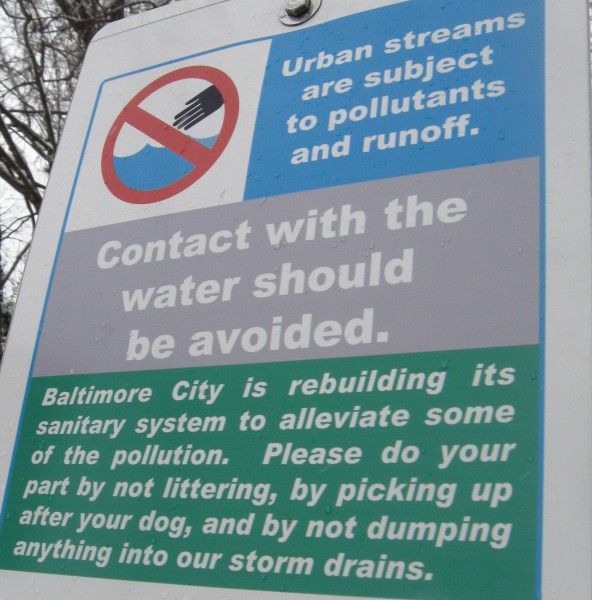By Timothy B. Wheeler
Bay Journal
It appears that a federal judge will have to settle a serious disagreement over whether the city of Baltimore has a credible new plan for curtailing the frequent sewage overflows and chronic leaks that have long made the harbor and urban waters unsafe for recreation.
A local environmental group, Blue Water Baltimore, has asked a federal judge to reject the plan, unless it is further strengthened.
Earlier this month, federal and Maryland regulators announced that they had reached an agreement with the city on the modification of a 15-year-old consent decree that would give Baltimore another 13 years to complete a needed overhaul of its aged sewer system.
Under the agreement, the city pledged to carry out a series of upgrades that it projects should reduce overflows by 80% after four years, with further improvements to be completed by 2030.
City officials estimate the plan would cost another $1.6 billion, on top of nearly $1 billion already spent on repairs the past 14 years that so far have failed to fix the problem. Water and sewer rates charged residents and businesses have been repeatedly raised to finance the work.
Pushback on the plan
The revised plan, which was originally submitted to the U.S. District Court in Baltimore for approval in June 2016, has since been tweaked in closed-door talks over the last 14 months. Its unveiling last year drew withering criticism from environmental groups and aggrieved homeowners who’ve endured sewage backups into their homes.
The revisions included new provisions in response to the criticisms, notably a requirement that the city address the backups and establish a reimbursement program to help cover residents’ cleanups. It also called for greater transparency, with draft plans to be posted to the city’s website so the public can review and comment on them. And it would require publishing the results of stream monitoring for bacteria and other pollutants on a quarterly basis.
Both the U.S. Environmental Protection Agency and the Maryland Department of the Environment, which have been overseeing the city’s sewer overhaul, urged the court to accept the latest plan. Ben Grumbles, Maryland’s environment secretary, called it “a better contract for clean water and environmental justice.”
The state also pledged to provide $300 million in low-interest loans to the city and suburban Baltimore County to help cover costs to repair the sewer system that handles waste from both jurisdictions.
Revisions drew muted response
When initially unveiled by the city in August, the revisions to the consent decree had drawn a mixed but muted response from environmental groups. The Environmental Integrity Project said it would have liked to see the overhaul completed more quickly, but it praised the city’s pledge to consider at least some compensation for sewage backups as a “step in the right direction.” Residents in some neighborhoods have had to undertake costly cleanups of fouled basements, without any compensation from the city.
Blue Water Baltimore, the metropolitan area’s watershed watchdog, likewise cited improvements in the deal, but weighed in with a fundamental complaint — that after 14 years of repairs had failed to fix the problem, there was no guarantee the new repair plan would work, either.
The environmental group urged the consent decree be tied to measurable improvements in levels of bacteria and other pollutants in the streams and harbor. And it wanted a requirement that the city adjust its plans and do more if monitoring doesn’t show sufficient improvements.
A city spokesman dismissed that criticism at the time by noting that the city’s streams and harbor are polluted by stormwater runoff and other sources in addition to sewage overflows. The city is tackling those problems, too, and the consent decree is only meant to address the overflows, said Jeff Raymond, communications director for the Department of Public Works.
Blue Water goes to court
On Wednesday, Blue Water Baltimore took its objections to court. Previously granted the right to intervene in the case, the group filed a motion in federal court contending that despite some improvements, the agreement has been seriously compromised by a previously undisclosed provision.
The provision prohibits the state or the EPA from using the stream monitoring data to order additional repairs by the city if the planned upgrades are not having the promised result of reducing bacteria levels and making the water safer for human contact.
The environmental group filed a motion Wednesday in opposition to the consent decree, asking the court to deny approval unless that provision is removed.
“Blue Water Baltimore is pleased that the modified sewage consent decree contains new provisions we have long been advocating for, including requirements to address sewage back-ups into residences, water quality monitoring, and increased opportunity for public comment,” said Angela Haren, the group’s director of advocacy and Baltimore Harbor Waterkeeper, in an emailed statement.
“We remain concerned, however,” she added, “about a change to the decree, which expressly prohibits the state and federal government from considering that same water quality data when evaluating implementation progress under the decree. This provision marks a departure from the principles of adaptive management based on sound science.”
twheeler@bayjournal.com
Bay Journal is published by Bay Journal Media, a 501(c)(3) nonprofit, to inform the public about issues that affect the Chesapeake Bay. A print edition is published monthly and is distributed free of charge. News, features and commentary are available free online at bayjournal.com. MarylandReporter.com is partnering with the Bay Journal by publishing one of its articles every Friday.





Recent Comments